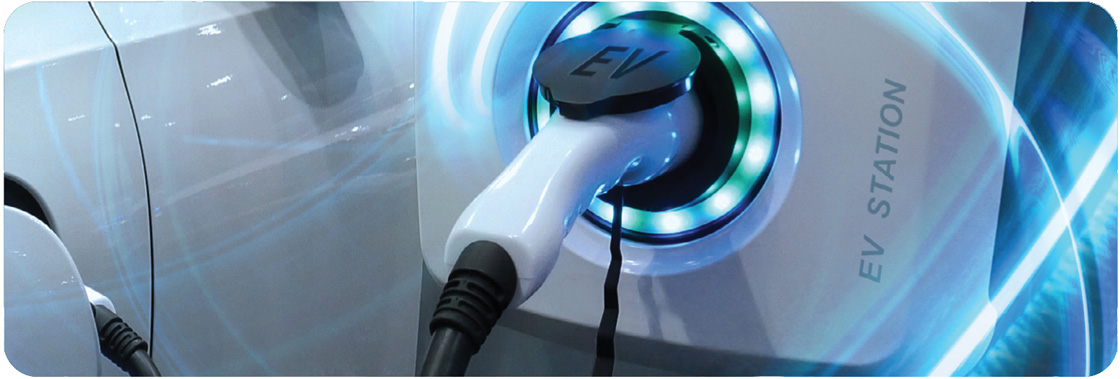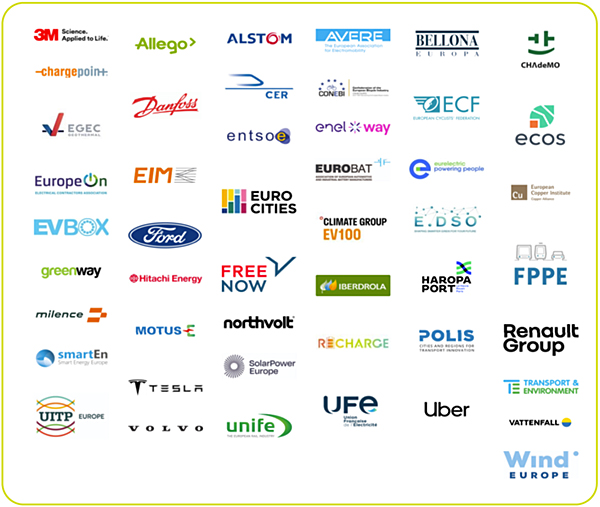 The agreement to pursue zero emissions for Europe's new cars and vans by 2035 has set a clear direction and an unequivocal target for sustainable transport measures; with the last legislative session providing backing for the European Green Deal. We fully back these efforts, and urge support through enhancements to the existing charging infrastructure, the development of alternatives such as a strong rail network and a sustainable batteries value chain.
The agreement to pursue zero emissions for Europe's new cars and vans by 2035 has set a clear direction and an unequivocal target for sustainable transport measures; with the last legislative session providing backing for the European Green Deal. We fully back these efforts, and urge support through enhancements to the existing charging infrastructure, the development of alternatives such as a strong rail network and a sustainable batteries value chain.
However, in order to make the Green transition a reality, and bring its benefits to people, the planet and business, it is vital that we act now. Making the transition to e-mobility must be a priority, not simply to deliver environmental sustainability but also to reinforce the EU's industrial strength, security and competitiveness.
Now is the time to put the Green Deal into action
The Green Deal, its technologies and fully electric transport modes will significantly reduce Europe's dependency on fossil fuels. Recent geopolitical events have shown the importance of ensuring energy security and resource independence.
The Green Deal will also make the EU a global leader in the sustainable transport industries. It will position Europe as an authoritative voice on the need for climate change action while bringing welcome economic growth and the creation of highquality jobs.
The Green Deal will allow Europe to prioritise the quality of life of its current and future workforce. This will see the highest social standards put in place to protect the interests and livelihoods of Europe’s workers, both now and as part of a sustainable future.
An effective green industrial policy will bring the benefits of Europe's Green Deal to all.
Continuing and rapid decarbonisation is crucial: but it must be done in such a way that preserves Europe’s competitiveness. Nowhere is this more important than in transport and mobility. The Platform for electromobility – an alliance of companies, cities and NGOs – brings the knowledge and expertise to make an effective and efficient mobility transition a reality.
To do so, the Platform is calling on future legislators to prioritise the following actions in 2024-2029:
1. A Green and Just Industrial Policy
Main policy ideas:
- Creating an integrated recycling industry ecosystem in Europe.
- Smartening and upgrading existing grid infrastructure to allow it to support greater levels of renewable energy.
- Ensuring strong end-of-life vehicles regulation, focused on low carbon and recycled materials.
One of the richest 'urban mines' available to Europe is the supply of old batteries and other waste materials. By investing in integrated recycling and repurposing facilities for collecting, dismantling, recovering or reusing valuable metals from batteries, Europe can, by 2040, secure a large share of the metal resources it needs for battery production. Such an approach not just reduces waste, it is also scalable, preserving and reusing precious raw materials and keeping a greater proportion of them within Europe, increasing our strategic autonomy.
The overall concept of Europe keeping potentially valuable waste within its borders is one that should be widely adopted. Environmental recycling standards vary; exporting waste for processing to locations without equivalent standards undermines our own attempts to reduce environmental impacts. The EU should encourage recycling by establishing a harmonised approach to the intra-EU shipment of spent batteries. All. Executed properly, this can make Europe competitive in battery recycling, ensure the highest environmental standards and help create a flourishing recycling industry in the future
Resilient, affordable renewable energy will be key to a successful industrial policy; however, this demands that the correct grid assets are in place. With a European Grids Package, Europe can refresh and upgrade its infrastructure to meet the demand to accommodate higher levels of renewable energy. Although this will require investment, doing so will allow Europe to tap into its future grid asset – electric vehicles. It will accelerate the connection of chargers and other Green Deal enabling technologies and allow Europe to tap into the huge energy storage potential offered by electric vehicles.
Europe must also go further than simply reducing vehicle engine emissions; it needs a more holistic approach to reducing the environmental footprint of all road vehicles. This means decarbonising manufacturing materials, increasing manufacturing efficiency and maximising the circularity of the materials used. Introducing digital product passports, revamping EU products policy to reduce environmental footprints and committing to deliver a strong endof- life vehicles regulation based on low carbon and recycled materials, will be the key drivers for such change in the years ahead.
Finally, while a renewed European industrial policy has focused on key components and sub-systems, it is important that it considers the full scope of the mobility industries' value chains supporting their global competitiveness as they address the green transitions.
2. Investment Plan to implement the Green Deal
Main policy ideas:
- Making it easier for green energy transition sectors to access current EU funding mechanisms.
- Deploying infrastructures to support zero-emission passenger and freight transport across Europe.
- Introducing a dedicated budget for urban nodes, to avoid cities becoming a weak link.
The 2023 Net Zero Industrial Act and the Critical Raw Materials Act needs an accompanying European Net- Zero Infrastructure Investment Plan. A long-term, easy-to-access investment facility – aimed at sectors key to Net Zero – should be a core issue during the European elections.
Freight and logistics infrastructure are a vital component in the movement of goods within Europe. There should be comprehensive investment in developing and deploying sustainable logistics infrastructure. The key elements for decarbonising freight in Europe while remaining competitive are the roll-out of high-power charging infrastructure required for deploying electric trucks of all ranges, the completion of a high quality, interoperable rail network with very high-speed connections, while ensuring a level playing field with other non-emitting modes of transport of goods.
Europe must also improve support for urban transport. Cities are working to accelerate the modal shift and to increase the electrification of their vehicle fleets. To avoid cities becoming the weakest links Europe should be providing parallel support to investments in zero-emission public transport networks and to the deployment of smart and efficient charging infrastructure within urban areas. To support the required local infrastructure investments, the next Connecting Europe Facility (CEF) transport programme should include a dedicated budget for urban nodes, building upon the experience of the Alternative Fuel Infrastructure Facility.
Further support from EU research and innovation programmes as well as guidance, will also be needed to overcome challenges such as the constraint of public space, uneven distribution of private investments in EV charging infrastructure in cities or their integration in multimodal hubs, as well as lack of grid capacity.
Net Zero Sectors include the sustainable mining, processing and recycling of critical minerals and metals, modernising power grids and facilities for industrial material recovery as well as renewable energy production. Although existing European funds could contribute significantly, prioritising access to the current EU funding mechanisms and tailoring them to the specific needs of the sustainable transports value chain participants is essential.
3. People at the heart of the e-mobility ecosystem
Main policy ideas:
- Supporting reskilling programmes to attract workers from traditional industrial sectors and aiding their transition into these emerging sectors.
- Enabling Vehicle-to-Grid (V2G).
- Mandating electric vehicle adoption in corporate fleets.
As Europe shifts to a green economy, the demand for workers in industries such as critical raw materials, batteries and renewable energy industries will grow. Therefore, it will be essential to allocate EU resources and support to help steer young people into those technical fields essential for the green transition.
There should be communication campaigns aimed at raising the visibility – and value – of these technical fields. It will also be crucial to implement well-funded reskilling programmes that will attract workers away from existing traditional industrial sectors and into emerging sectors such as renewable energy, grid management, infrastructures and recycling. These programmes will upgrade workers' skills, train future workforces and ensure a just transition for the workers, their employers, and regional authorities.

The wider adoption of electric vehicles and rooftop photovoltaic solutions offer significant opportunity to unleash 'prosumer potential' in Europe. Restructuring Europe’s electricity market will allow us to maximise this potential, specifically through creating opportunities for Vehicle-to-Grid (V2G) where appropriate. This would enable EV drivers to take an active part to the transition by supplying power back to the grid. Allowing them to be rewarded for providing additional grid capacity and thus making the energy system more dynamic and resilient.
It is critical that zero-emission mobility is affordable to everyone. To that end, both old and new electric mobility solutions must be scaled up across Europe: Existing facilities include public transport offerings, shared cars and e-bikes for situations where individual cars are unnecessary.
When they are unavoidable, newer solutions include low-cost leasing options, targeted purchase incentives policies and industrial strategies that support the deployment of smaller, more-efficient battery models should be provided. The rapid uptake of electric vehicles within corporate fleets will accelerate their secondhand availability. Implementing the Climate Social Fund should help drive this transition with the least possible impact on lower income families.
In conclusion, the Platform's key policy asks revolve around enhancing autonomy, promoting sustainability, and economic prosperity both for clean transports industries and for their consumers. We believe that by prioritizing these issues, we can pave the way for resilient, global-leading Europe. To learn more about our policy initiatives and hear from our dedicated members, we invite you to get in touch with us. Together, let's create the sustainable transport system of tomorrow. Reach out to us today!
